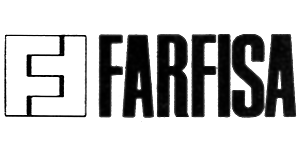
Farfisa ("FAbbriche Riunite di FISArmoniche" or "combined accordion factories") is a manufacturer of electronic musical instruments, based in Osimo, Italy.
Today, Farfisa produces intercom systems together with Aci Farfisa, which manages access control, video surveillance and home automation systems. Earlier the brand name was associated with the manufacturing of compact electronic organs and multitimbral synthesizers.
Farfisa, which used to have three own factories in Italy, also produced radio, televisions and other electronics.
Bontempi group owns Farfisa subdivision, engaged in keyboard making.
The company began producing electronic organs in 1964. Initially, they were known as CMI organs, since the instruments of the Italian brand in the US were distributed by the company Chicago Musical Instrument Co, which also owned Gibson. The first models of the Compact series were produced from 1964 to 1968. In 1968, the production of the Professional series began, and the NAMM show introduced the FAST (Farfisa All-Silicon Transistorized) organ series.
Farfisa proved to be quite a popular brand among musicians of the 60s and 70s. One of the first to evaluate the products of Italian masters was Domingo Samudio from Sam the Sham & the Pharaohs in 1965. A year later you could hear the voice of the instrument in the The Swingin 'Medallions band’s record "Double Shot (Of My Baby's Love"). In the 60's, Spooner Oldham used to play Farfisa using the instrument in his compositions. Farfisa Compact Duo also participated in the creation of the early Pink Floyd albums. Richard Wright liked to use both Hammond and Farfisa, giving Farfisa a part in the Time composition and performing Echoes with the help of it during the tour of 2006.
Woodstock 69 also documented Farfisa Professional among Sly and the Family Stone equipment. The Professional series was also used by Hugh Banton, a British organist. Farfisa could be seen also in the arrangement of "Dancing Days" by Led Zeppelin. Farfisa's touch was brought by Herbie Hancock in 1970 in the album A Tribute to Jack Johnson.
In the 70's, Farfisa was still in fashion - this is proved by such bands as Blondie, Squeeze and Talking Heads. Much later Farfisa was used by Green Day in their track "Misery". Elton John used the organ in his Crocodile Rock composition.
Today, brand instruments are often used to add some retro voice of the 60s.
In 1981, the company produced a 200-kilogram expensive Pergamon model.
From 1964 to 1969, the brand produced the Compact series. The Compact Duo made it possible to manage the tone and volume by controlling the F/AR preamp and reverb. Mini-compact offered only 4 octaves, and the latest version – the bass selector-switch for the lower octave.
Early Compact models included one bass octave with color-inversed keys, oboe sounds, flute, trumpet, piccolo and strings, 4 vibrato settings, 3 reverb settings, 3 bass volume switches, multi-tone booster, expression pedal, tube preamp and spring reverb.
The later Compact versions were distinguished by the presence of two lower octaves, control of the volume balance between bass and treble featured on the front panel, sharp and soft options.
A series of Compact deluxe was also produced (late models included a rhythm section - brush cymbal and drum). The most popular series of Compact duo was used by Al Kooper, Michael MacNeil of Simple Minds, Rick Wright of Pink Floyd and Clint Boon of The Inspiral Carpets. Later models of Compact duo included tremolo, percussion and repeat function for the upper and lower manuals of the keyboard individually. The Compact duo series required a separate power supply, a solid-state pre-amplifier and a spring reverb unit that would be connected using a multi-lead cable with some differences between the American and European versions.
FAST (Farfisa All Silicon Transistor) series was encased in a metal housing with plastic edges and chrome folding legs. Fast 3 offered a 49-note keyboard, 12-key bass part, selector bass/treble and piano/forte, 2 vibrato modes, 7 instruments. Fast 4 was represented by 61 keys, 8 instruments, 4 vibrato modes, 5 percussion modes. Fast 5 in addition to the functions of the model 4 offered 3 Sustain Stop options.
From 1968 to 1975, the Professional series was produced, which were approved by Tangerine Dream, Jean Michel Jarre, Kevin Ayers and Hugh Banton of Van der Graaf Generator. There were DUO and Piano versions launched.
Farfisa also produced VIP series (John Paul Jones of Led Zeppelin liked to play VIP 255), the Matador series with a built-in speaker and amplifier, a 3-octave Stereo Syntorchestra keyboard with mono (modified by 2 envelopes, wah-wah and portamento) and poly tone-generator sections. In the 1970s, the company produced the String Orchestra, which included piano and string sections, as well as a non-organ Soundmaker instrument, represented by sections of strings, brass and monosynth voices.
In the late 1970s, Farfisa released Polychrome, the most complete analog synthesizer of the brand, offering sections of vocals, brass, string and percussion instruments, and included chorus, phaser, modulation and keyboard with aftertouch.
Transicord is an electronic transistor accordion or сombo organ shaped as an accordion, which could be connected to brand amplifiers. Two models were released - the standard one and DeLuxe.
In the late 1970's Farfisa produced combo organs Bravo, light and simple, and Commander, a design reminiscent of the updated VIP 205.


